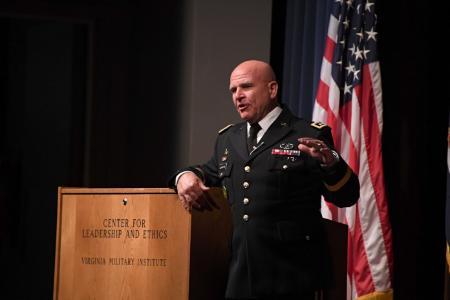Strategy Essential in Post-Cold War Geopolitics

Lt. Gen. H.R. McMaster addresses conference participants in Gillis Theatre. – VMI Photo by H. Lockwood McLaughlin.
LEXINGTON, Va., Nov. 3, 2016 – Lt. Gen. H.R. McMaster spoke at VMI about the importance of strategy in the training of future U.S. military leaders today as part of the H.B. Johnson, Jr. ’26 Distinguished Speaker series. The talk was given during VMI’s seventh annual Leadership and Ethics Conference, “Strategic Leadership in Times of Global Transition: Past, Present, and Future,” which began yesterday.
McMasters, who is the director of the Army Capabilities Integration Center, shared insights from his work, which, said VMI Center for Leadership and Ethics director Col. David Gray in introducing McMasters, requires him “to think full time about the next war and how to win it.”
Visiting VMI for the first time, McMaster spoke of the many VMI graduates he has known during his career and the importance of a school like VMI to turn out leaders. He also recognized that the future leaders he was addressing would face a critical time in U.S. history, a time of global transition that began on Sept. 11, 2001.
“Among the young men and women here today may be the next [George C.] Marshall,” said McMaster. “But the problems he or she faces, like the problems of Gen. Marshall’s time, will be too big for any one man or woman, so we all might aspire to be more like Gen. Marshall – to study history and strategy to understand the nature of competition with enemies and adversaries, to recognize that we also must know ourselves and maintain the will, the will necessary to prevail and preserve our way of life.”
Reviewing those dangers, he emphasized the rise of geopolitics in the post-Cold War era.
“The threat of terrorism is not the only danger that you Marshalls of the future will confront,” he explained. “Geopolitics has returned, as U.S. rivals from Europe to the greater Middle East to East Asia attempt to collapse the post-World War II political, economic, and security order that Gen. Marshall helped to establish.”
McMaster was quick to point out that America’s greatest asset in a geopolitical arena is strategy, yet strategy among U.S. leaders, he suggested, is the nation’s greatest deficiency. He said there is confusion about what strategy even is, and that confusion has led to a “narcissistic” approach in handling global situations.
“Strategies are frequently based on what the purveyor prefers rather than what the situation demands,” he said.
McMaster outlined three points to consider in order to regain strategic confidence: the first was simply knowing what strategy is, the second was acknowledging the competitive nature of strategy, and the third was knowing the willingness of the nation to execute the strategy.
During the question and answer session, McMaster recommended several books that outline global conflicts that are “real threats in real places.”
He also admitted that, “No matter how hard you try to do it you’re going to be wrong, something is going to surprise you. The key,” he continued, “is not to be too far off the mark.”
The conference closes today after two afternoon discussion panels and closing remarks by Gray.
– Kelly Nye
-VMI-
.svg)
.png)